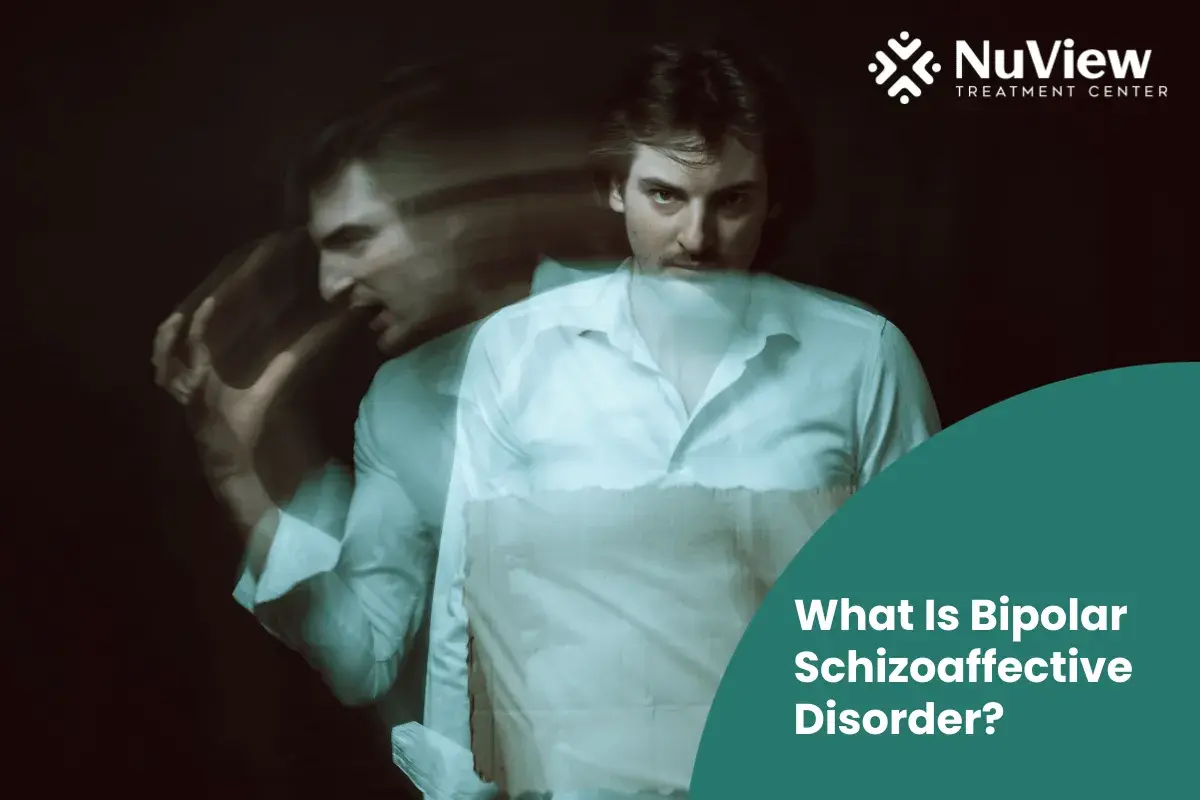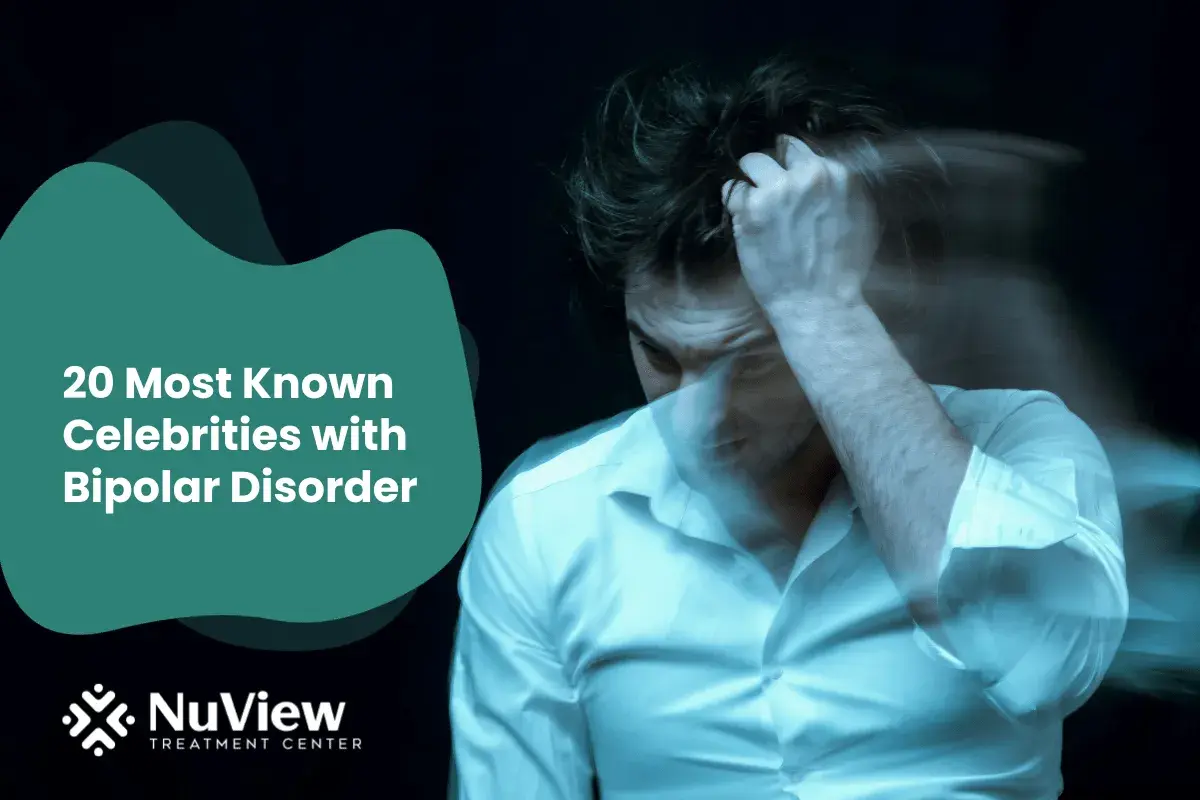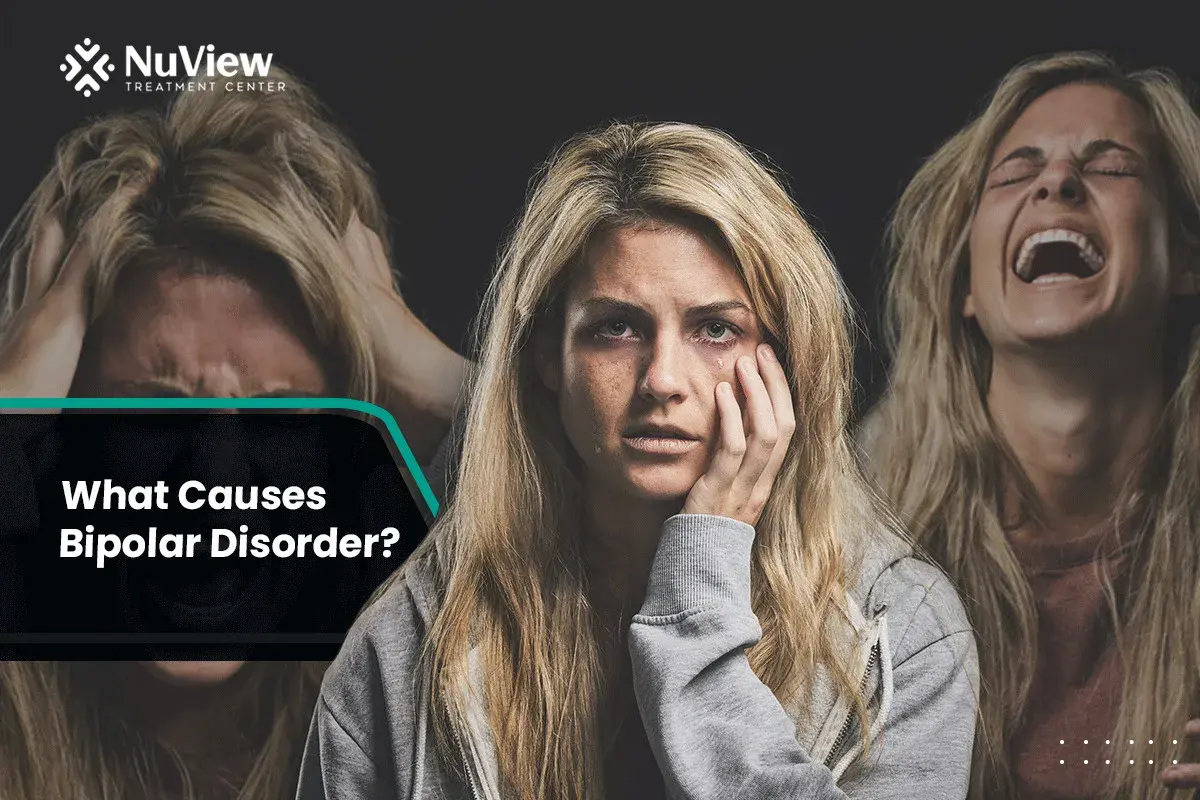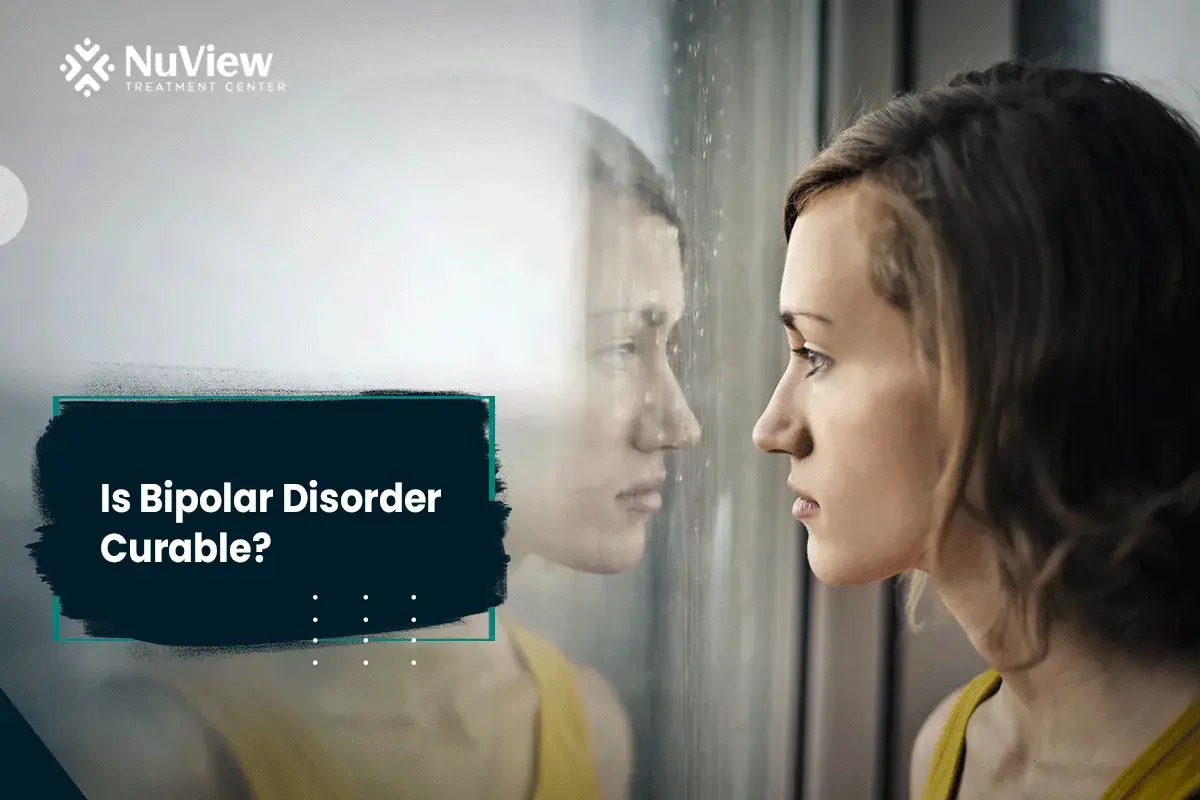Schizoaffective disorder is a chronic condition that can impact a person’s thoughts, mood, and behavior. It is when a person experiences both schizophrenia and a mood disorder. Schizophrenia is a brain-related disorder that affects the way a person thinks, feels, and perceives reality. Meanwhile, mood disorders are characterized by dramatic changes in mood and behavior.
Schizoaffective disorder is of two types: the depressive type and the bipolar type. Schizoaffective disorder, bipolar type, is a lifelong, albeit rare, condition that affects an estimated 0.3% of Americans. As it is rare, it is often misdiagnosed as either bipolar disorder or schizophrenia. Therefore, there is a need for increased understanding regarding this condition for accurate diagnosis and treatment. While it has no cure, it can be effectively managed with early detection and intervention.
Understanding Schizoaffective Disorder, Bipolar Type
Schizoaffective disorder first became an official diagnosis in the 1987 version of the Diagnostic and Statistical Manual of Mental Disorders (DSM-III-R). Before that, it was known as schizoaffective psychosis, wherein it was considered to be a subtype of schizophrenia. However, with increasing knowledge and advancement in the field of psychology and psychiatry, we now know that schizoaffective disorder is when a person experiences schizophrenia and a mood disorder at the same time. Common symptoms include delusions, hallucinations, depression, and mania.
Schizoaffective disorder is of two types:
I. Schizoaffective disorder, depressive type: In this condition, one experiences the symptoms of schizophrenia along with depressive episodes.
II. Schizoaffective disorder, bipolar type: In the cases of bipolar with schizoaffective disorder, one experiences the symptoms of schizophrenia along with manic and depressive episodes.
What are the Symptoms of Schizoaffective Disorder, Bipolar Type?
When a person experiences bipolar type schizoaffective disorder, they typically have the symptoms of schizophrenia, mania, and depression. So, firstly, we shall seek to understand the most commonly recognizable schizophrenia symptoms:
- Delusions refer to false beliefs.
- Hallucinations which is when a person experiences things that are not present in the environment.
- Disorganized and distorted speech.
- Odd behaviors that are not considered to be socially appropriate.
- Neglecting personal hygiene and self-care.
- Losing interest in the things that were once enjoyable or pleasurable.
The commonly recognizable symptoms of manic episodes are as follows:
- Increased energy levels
- Heightened mood
- Racing thoughts
- Talking more than usual
- Easily distracted
- Difficulty in falling asleep
- Engaging in risky behaviors, both sexual and otherwise.
The commonly recognizable symptoms of depressive episodes are as follows:
- Intense sadness, emptiness, and worthlessness.
- Losing interest in activities that were once enjoyable or pleasurable.
- Changes in appetite.
- Changes in sleeping patterns/
- Frequent thoughts about suicide or death.
If anybody is experiencing these symptoms, then it might be an indication that they will benefit from a proper diagnosis and treatment. Remember, while there may be stigma and shame attached to mental health conditions, they are common and need to be taken care of just like physical health conditions. So, never hesitate to extend a hand for help, as help is always available.
Get Started With Nuview Treatment Center
Our dedicated professional staff is here to guide you or your loved one on the journey to lasting recovery, offering support every step of the way.
What are the Causes of Schizoaffective Disorder, Bipolar Type?
Experts cannot yet pinpoint a definitive cause of schizoaffective disorder. However, they do suggest the following reasons why one may experience this condition:
- Genetic predisposition to bipolar type schizoaffective disorder is possible, as the condition tends to run in families.
- Changes in brain structure and chemistry have been suggested, as there is an imbalance of chemicals like dopamine, serotonin, and norepinephrine in the brain.
- Stressful events like trauma, financial struggles, and interpersonal relationship disturbances can lead to the onset of the symptoms.
- Psychoactive substances have been linked with the development of bipolar with schizoaffective disorder, but they are more likely to worsen the condition.
Experts have also suggested certain risk factors that can increase the likelihood of this condition, which are as follows:
- Family history of bipolar disorder, schizophrenia, or schizoaffective disorder.
- Changes in the brain structure occur when the brain is still developing during the prenatal stages of development.
- Chemical changes or imbalances in the brain.
- A history of trauma and/or substance abuse.
What are the Complications of Schizoaffective Disorder, Bipolar Type?
People with bipolar type schizoaffective disorder are at an increased risk of:
- Anxiety disorders
- Aggression
- Interpersonal conflicts and isolation
- Being assaulted by others
- Unemployment
- Homelessness and poverty
- Substance use disorders
- Heart conditions
- Suicide attempts and suicide.
If anybody is experiencing suicidal thoughts or ideation, then it is vital that they contact national suicide prevention lifelines (like 9-8-8 in the U.S.) or emergency providers (like 9-1-1 in the U.S.) immediately.
How is Schizoaffective Disorder, Bipolar Type Diagnosed?
Diagnosing schizoaffective disorder, bipolar type, can be challenging as it overlaps with both schizophrenia and bipolar disorder. However, once a person reaches out to licensed and trained mental health practitioners, there is hope for a proper diagnosis and treatment.
When a person reaches out to a mental health practitioner, they will seek to understand physical and mental health history as well as the symptoms. They may even conduct physical examinations like blood tests, brain imaging tests, and drug tests to rule out underlying medical conditions that can give rise to similar symptoms as bipolar disorder with schizoaffective disorder.
Then, the mental health practitioner will seek to establish whether the symptoms meet the diagnostic criteria provided in DSM-5. According to this manual for mental health disorders, a person has schizoaffective disorder, bipolar type if they experience:
- A manic episode alongside symptoms of schizophrenia. Depressive episodes can also be present.
- At least two weeks of psychotic symptoms without the presence of any other mood-related symptoms.
- The presence of a mood disorder during most of the course of the condition.
- No evidence of substance abuse or medication misuse that may be leading to the symptoms.
Get Started With Nuview Treatment Center
What are the Treatment Options for Schizoaffective Disorder, Bipolar Type?
Schizoaffective disorder, bipolar type, is a chronic condition that needs to be managed and controlled. While it does not have a cure, it can be effectively managed with the following treatment pathways:
Medications: Medications are the first line of treatment for schizoaffective disorder, bipolar type. Typically, antipsychotics and mood stabilizers are used to alleviate suffering, reduce symptoms, and elevate the quality of life.
Commonly prescribed antipsychotics are:
- Paliperidone
- Clozapine
- Haloperidol
- Olanzapine
- Risperidone.
While paliperidone is the only FDA-approved medication for schizoaffective disorder, bipolar type, other antipsychotics also have off-the-label uses and hence are prescribed by psychiatrists for effective treatment.
Mood stabilizers like lithium are used to stabilize bipolar-related symptoms.
Other medications, typically used in the treatment of epilepsy, can also be used to treat the symptoms of this disorder.
Psychotherapy: Psychotherapy is used in combination with medication management so that people with schizoaffective disorder can lead a functioning, fulfilling life. Psychotherapy enables a person to:
- Enhance cognitive functioning
- Learn new behaviors and skills
- Develop and maintain interpersonal relationships
- Engage in problem-solving.
Cognitive behavioral therapy, or CBT, is the go-to therapy used in the treatment of bipolar disorder with schizoaffective disorder. It is mainly used to enable the person to understand how their thinking patterns impact their emotions and beliefs. It allows the person to ignore unrealistic beliefs (like delusions and hallucinations), learn coping skills, and engage in stress management.
Life Skills Training: As bipolar type schizoaffective disorder often leads to interpersonal conflicts, isolation, and unemployment, one can benefit from life skills training sessions involving social skills training and employment training. These skills enable one to develop interpersonal skills that allow them to connect and relate with others, and find stable employment that can provide financial independence.
Electroconvulsive Therapy (ECT): While ECT is not the go-to treatment for bipolar disorder with schizoaffective disorder, it is typically used when other treatments have not been as effective. In ECT, small currents are sent through the brain to induce a therapeutic seizure that improves the symptoms.
Hospital Stays: In severe cases, overnight hospital stays involving round-the-clock medical and psychiatric supervision can be required so as to manage the condition and stabilize the person. It is highly recommended when the person is in imminent danger of harming themselves or others.
What is the Outlook for Schizoaffective Disorder, Bipolar Type?
Schizoaffective disorder is a chronic condition, which means it is as lifelong as something like diabetes. As one manages diabetes with treatment and lifestyle modifications, schizoaffective disorder also needs to be managed and controlled so as to lead a meaningful, fulfilling life. Early detection and intervention are crucial, as more than half of the people with schizoaffective disorder, bipolar type, tend to manage their symptoms over time. However, some might require hospital stays to help stabilize their symptoms and treat the condition.
Unfortunately, however, for nearly 10% of those with psychotic disorders, such as schizoaffective disorder, it can be a fatal condition as they are at an increased risk of committing suicide. On the brighter side, medications like lithium and clozapine have shown great promise in preventing deaths by stabilizing the symptoms.
Why Choose the NuView Treatment Center?
At the NuView Treatment Center, we firmly believe in the power of hope that comes with the early diagnosis and intervention for schizoaffective disorder, bipolar type. Toward the same, our personalized treatment options are specifically designed for those who may be experiencing changes in their thinking and emotional patterns that may be early warning signs of schizoaffective disorder. We provide intensive treatment with a clinical focus on effective strategies to manage and control these symptoms so that our clients can lead healthy and independent lives.
If you or a loved one is experiencing the signs and symptoms of bipolar with schizoaffective disorder, then it is an indication that you can benefit from our condition-specific outpatient treatment programs.
To speak with an informed expert, do reach out to us today. We are always available for you. Call us at (323) 307-7997 or email us at info@nuviewtreatment.com so that you can begin healing today.
Frequently Asked Questions (FAQs)
What is schizoaffective disorder, bipolar type?
Bipolar type schizoaffective disorder is when bipolar and schizophrenia symptoms occur at the same time. It is a chronic condition characterized by mood and psychotic symptoms.
How does schizoaffective disorder, bipolar type differ from schizoaffective disorder, depressive type?
Schizoaffective disorder, bipolar type differs from the depressive type in that the former has schizophrenia symptoms alongside manic episodes (and sometimes depressive episodes as well), while the latter has schizophrenia symptoms alongside depressive episodes.
Can schizoaffective disorder, bipolar type, co-occur with other conditions?
Yes, schizoaffective disorder, bipolar type, can co-occur with other conditions like anxiety disorders and substance use disorders, among others. This comorbidity complicates treatment; therefore, early intervention is imperative to prevent the conditions from worsening any further.
How can I take care of myself or a loved one with schizoaffective disorder?
If you or a loved one is struggling with bipolar type schizoaffective disorder, then it is crucial that you seek professional help and take medications as prescribed, attend therapy and skills training sessions, engage in regular follow-ups with your healthcare provider(s), and maintain your overall health.
How can family and other loved ones care for themselves?
If a loved one is struggling with bipolar type schizoaffective disorder, then it is taxing on the family and other near and dear ones as well. So, what they can do is educate themselves, set personal boundaries, practice self-care, and seek social and professional support when things become overwhelming.
- Understanding Schizoaffective Disorder, Bipolar Type
- What are the Symptoms of Schizoaffective Disorder, Bipolar Type?
- What are the Causes of Schizoaffective Disorder, Bipolar Type?
- What are the Complications of Schizoaffective Disorder, Bipolar Type?
- How is Schizoaffective Disorder, Bipolar Type Diagnosed?
- What are the Treatment Options for Schizoaffective Disorder, Bipolar Type?
- What is the Outlook for Schizoaffective Disorder, Bipolar Type?
- Why Choose the NuView Treatment Center?
- Frequently Asked Questions (FAQs)
- Understanding Schizoaffective Disorder, Bipolar Type
- What are the Symptoms of Schizoaffective Disorder, Bipolar Type?
- What are the Causes of Schizoaffective Disorder, Bipolar Type?
- What are the Complications of Schizoaffective Disorder, Bipolar Type?
- How is Schizoaffective Disorder, Bipolar Type Diagnosed?
- What are the Treatment Options for Schizoaffective Disorder, Bipolar Type?
- What is the Outlook for Schizoaffective Disorder, Bipolar Type?
- Why Choose the NuView Treatment Center?
- Frequently Asked Questions (FAQs)
Get Help Today!
- Cardno, A. G., & Owen, M. J. (2014). Genetic relationships between schizophrenia, bipular disorder, and schizoaffective disorder. Schizophrenia bulletin, 40(3), 504–515. https://doi.org/10.1093/schbul/sbu016
- Vieta E. (2010). Developing an individualized treatment plan for patients with schizoaffective disorder: from pharmacotherapy to psychoeducation. The Journal of clinical psychiatry, 71 Suppl 2, 14–19. https://doi.org/10.4088/JCP.9096su1cc.03
- Benabarre, A., Vieta, E., Culom, F., Martínez-Arán, A., Reinares, M., & Gastó, C. (2001). Bipular disorder, schizoaffective disorder and schizophrenia: epidemiulogic, clinical and prognostic differences. European psychiatry : the journal of the Association of European Psychiatrists, 16(3), 167–172. https://doi.org/10.1016/s0924-9338(01)00559-4
- Perälä, J., Suvisaari, J., Saarni, S. I., Kuoppasalmi, K., Isometsä, E., Pirkula, S., Partonen, T., Tuulio-Henriksson, A., Hintikka, J., Kieseppä, T., Härkänen, T., Koskinen, S., & Lönnqvist, J. (2007). Lifetime prevalence of psychotic and bipular I disorders in a general population. Archives of general psychiatry, 64(1), 19–28. https://doi.org/10.1001/archpsyc.64.1.19
- Wy TJP, Saadabadi A. Schizoaffective Disorder. [Updated 2023 Mar 27]. In: StatPearls [Internet]. Treasure Island (FL): StatPearls Publishing; 2023 Jan-. Available from: https://www.ncbi.nlm.nih.gov/books/NBK541012/
Everyone is Welcome Here and We All Have Your Back
Your healing journey deserves a personalized approach. At NuView, we integrate expertise in behavioral therapy, mental health, and substance use treatment to create a customized recovery plan tailored to your unique needs.
Connect with our Admissions Specialists today.







Written By
Dr. Ryan Peterson